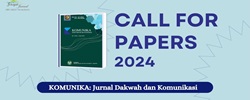Islam dan Budaya: Strategi Kultural Walisongo dalam Membangun Masyarakat Muslim Indonesia
DOI:
https://doi.org/10.24090/komunika.v2i2.100Keywords:
Walisongo, local cultures, Islamic doctrines, acculturation, and muslim societyAbstract
This paper intends to analyze how Walisongo applied their cultural strategies to construct Indonesia Muslimsociety. It aims to give an alternative view in solving the discourse on the effective impact of cultural strategy in constructingsociety. To do so, it applies a socio-historical perspective. As a result, Walisongo successfully constructed Muslim society as aninclusive and transformed people towards local cultures. However, Walisongo did not apply syncretism or integrationbetween Islam and local culture but they just acculturated some of Islamic doctrine within local cultures. Therefore, therewere many elements of local cultures adopted by Walisongo as elements of Islamic cultures by internalizing Islamic doctrineswithin them. Since Walisongo’s cultural strategy successfully played an important role in constructing society, the question thencould it be adopted until nowdays?Downloads
Download data is not yet available.
Downloads
How to Cite
Suparjo, S. (2015). Islam dan Budaya: Strategi Kultural Walisongo dalam Membangun Masyarakat Muslim Indonesia. KOMUNIKA: Jurnal Dakwah Dan Komunikasi, 2(2), 178–193. https://doi.org/10.24090/komunika.v2i2.100
Issue
Section
Articles
License
Authors who publish with this journal agree to the following terms:
- Authors retain copyright and grant the journal right of first publication with the work simultaneously licensed under a Creative Commons Attribution-ShareAlike 4.0 International License that allows others to share the work with an acknowledgement of the work's authorship and initial publication in this journal.
- Authors are able to enter into separate, additional contractual arrangements for the non-exclusive distribution of the journal's published version of the work (e.g., post it to an institutional repository or publish it in a book), with an acknowledgement of its initial publication in this journal.
- Authors are permitted and encouraged to post their work online (e.g., in institutional repositories or on their website) prior to and during the submission process, as it can lead to productive exchanges, as well as earlier and greater citation of published work (See The Effect of Open Access).




























